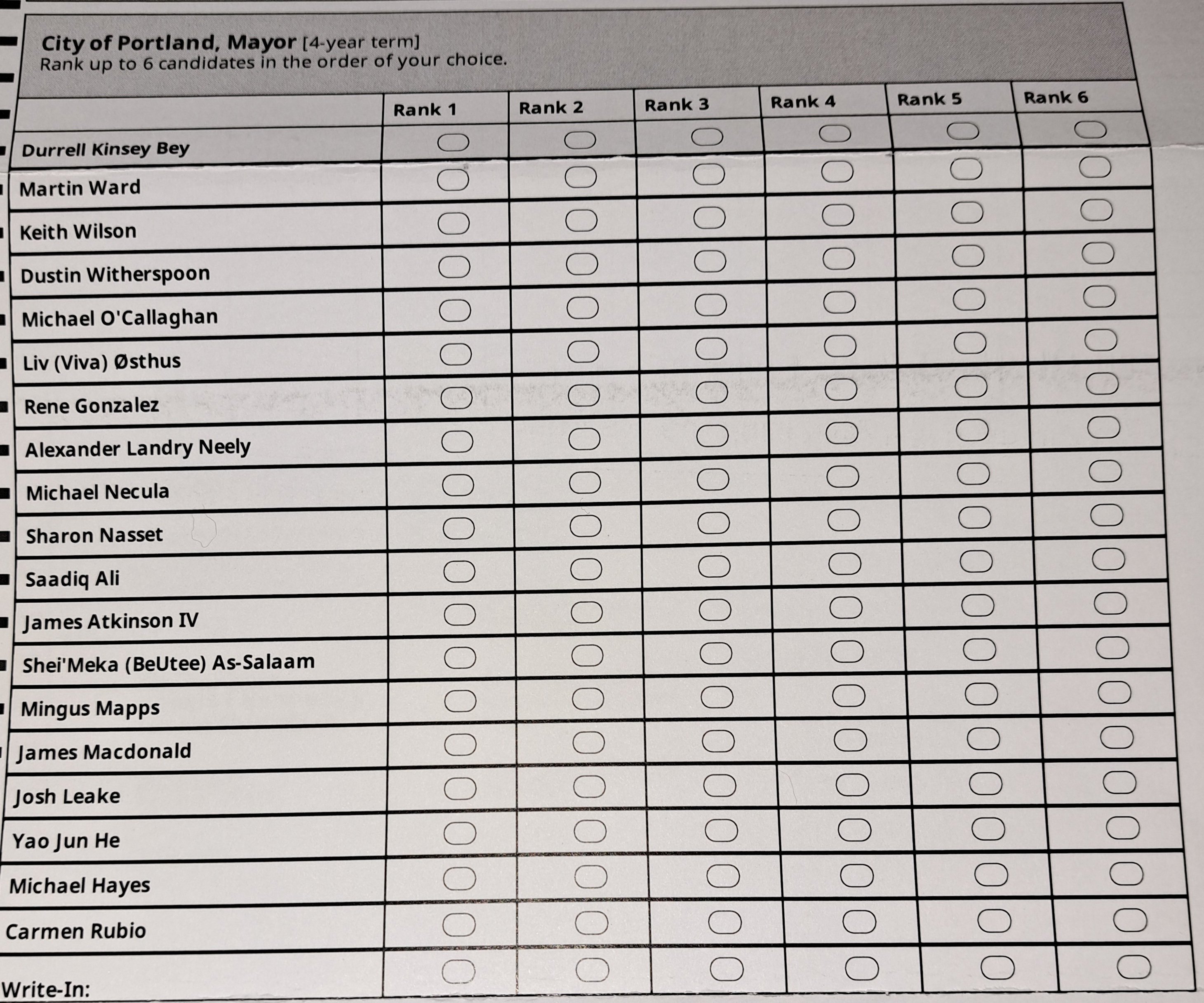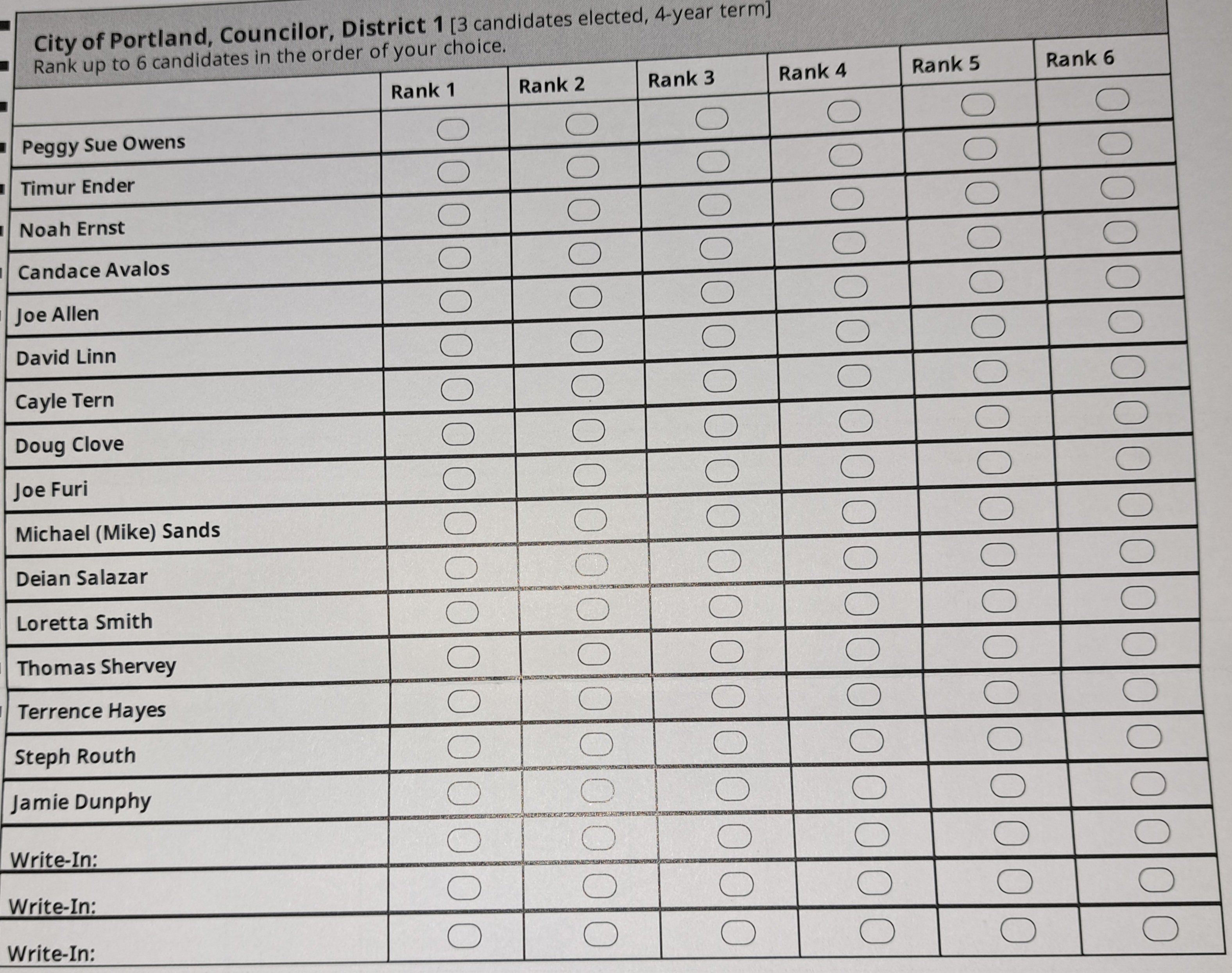Jesus Christ people are fucking stupid… How hard is this to understand??
Rhetorical question of course. The country is very stupid. Just today my coworker said “see Trump is our next president and the taxes already went down!” (he was referring to the interest rate decrease from the federal reserve…)
I have no idea what party these people belong to. It’s not listed on the sheet. Their policy positions aren’t shown. Their endorsements aren’t shown. Nobody knows who the fuck any of these people are.
What you need Ranked Choice Voting for is Congress and the Presidency. Local elections also need to be partisan. Otherwise how the fuck do you know where any of the candidates even generally stand on the issues?
Local candidates usually have websites, do interviews with local papers, and are suuuper excited to talk to potential voters, so people could look at any of that?
The city or county will probably have a thing called a website where you can read about all of those things for each candidate.
Is the website in the voting booth?
We do all of our voting by mail and get a pamphlet with most of the serious candidates. It is really great and we have like two weeks to work on it. It isn’t like we showed up at the poll and were confronted with this and had to fill it out on the spot.
We should also make vote by mail mandatory.
Local elections also need to be partisan. Otherwise how the fuck do you know where any of the candidates even generally stand on the issues?
I’d rather parties have no official role so we’re actually voting for people to represent us. Candidates have a responsibility to get their message out, and voters have a responsibility to do some research.
But that just doesn’t happen. We have to plan for the lowest common denominator.
Yeah, researching candidates is great and all, but like they didn’t exactly set themselves up for success with this ballot design.
It kinda sucks ass. :/
… You do research, you have a fucking week minimum after you receive your ballot. This isn’t complicated. Parties also have nothing to do with an individual representatives politics.
Non partisan elections.
I prefer having ballots not say what party the person is in. Then people actually have to know who they are voting for, not just blindly check a box beside R or D every time.
It’s not super hard to understand the concept, but the visual display of this implementation is objectively horrifying. No line or column delineation, just a grid of bubbles. I literally look at Excel sheets for a living and this makes my head hurt trying to keep track of what bubble is going where, I don’t blame voters for giving up on it.
Yeah that’s odd. How could it be better though and still be paper? Limit you to two votes?
In Australia, which has Ranked Choice Voting, you number the candidates from 1 to the max candidates. For Senate races, you can vote for the party, letting the party decide the down ballot representatives. https://www.theguardian.com/world/2013/aug/14/how-does-australia-s-voting-system-work
I believe in this process, the ballots are human counted, but the country has less than the population of California, so it probably doesn’t take too long. Scaling it up for the backwards US system would be harder, but not impossible to improve.
It would be better to just give the voter a set of 6 lines, top to bottom, with rank 1 at top and rank 6 at bottom. That is the easiest to visualize and understand, and that’s also how almost all of the campaign information about RCV has shown it… Then have some way to identify each candidate to put on each line that’s not just hand writing the name. That I’m not 100% sure how to do. My engineer solution says create a lookup table with letters or numbers next to each candidate, but that could easily get confused with the rank in which to put them.
Here’s an engineer’s solution: raise the threshold for the number of signatures required to get on the ballot, and don’t let someone sign a petition for more than one candidate for a given race.
don’t let someone sign a petition for more than one candidate for a given race.
This would be so much overhead work and also defeat the purpose of Ranked Choice Voting. This basically moves the First Past the Post earlier in the process, which will exclude candidates
It’s less understanding/stupidity and more an issue with laziness/desire. I have no doubt that 99% of people who actually did vote selected their first rank choice and say eff it to the rest of the rankings. Too much effort and time to complete.
I think I’d still file that under stupid.
I really hope mail ballots become the norm. It was absolutely wonderful to be able to take the time to look people/propositions I didn’t know up while I had the ballot there. That won’t help with laziness though. Can’t help lazy. :/
Just a note on mail ballots. Some can often abuse it by coercing their spouses to vote a particular way.
As somebody said in another comment, there were 19 candidates to choose from for mayor alone, and then 16-30 candidates for each district. That’s up to 50 candidates to research to fill out a ballot, in combination with the poor formatting of these ballots. You’ve got 30 names with 6 bubbles next to every single one of them that you have to follow across to fill out your 6 choices. I’ve seen better formatted scantron test sheets.
If this had been the size of a normal primary election or something - around 3-6 candidates or something - I think people would’ve found it pretty easy to understand.
people voted for the guy that said he would stop future voting
that is where the USA is at
“Mission accomplished” 🛩️🪂🛳️
The story buries the lede: there were 19 candidates on the ballot for mayor and 16-30 for each city council district. Several of the experts cited speculate that the number of candidates overwhelmed voters.
I always go over a sample ballot in advance and research each candidate. I would not have liked to do so for that election; local elections are difficult to research in general with many candidates getting minimal press and some not even bothering to put up websites.
It’s the paradox of choice. With more options, people become more likely to not choose because it’s overwhelming.
according to some in this thread that makes them ‘fucking stupid’
Odd implementation of ranked choice. Probably too many choices without party affiliation listed for voters that didn’t come into the booth having already researched the choices. Sad because this will probably get used to say the whole concept is bad.
No voting booths here in Oregon. We get our ballots mailed to us along with a voter’s guide book with a page for each candidate. I’ve never seen anywhere near that many candidates before, though.
It was a lot because this was the first election with our new system of government. It should settle down next time.
A selection of up to 30 candidates for a ranked choice does sound daunting. Yet despite that 80% of those that voted did complete those sections. That doesn’t sound unreasonable to me.
Edit: mentioned city council specifically. Changed to more generic phrasing.
Those pictures are brutal. You need to run some kind of preliminary if you’re going to have that many candidates over all. This isn’t an RCV failing it’s a failure to narrow the field with things like signature requirements.
I don’t think it’s that bad really. Someone mentioned 40+ candidates on a ballot in Germany.
I don’t remember ever seeing primaries for local government office positions.
Apparently they had to vote their entire local government in this time because they reorganized it. In the future it will be a smaller field.
That… doesn’t seem overwhelming?
In the city council election I voted in (Germany) you had ~40 votes (don’t remember the exact number) to distribute among candidates. Each party put up to ~40 candidates on the ballot and you had to distribute your vote among the candidates. You received like 10 ballots, with each party being on a separate one and had to cast your vote in an envelope with the relevant ballots.
Additionally, you can give up to 3 of your votes to any one candidate by putting a digit next to their name or just cast one party’s ballot without entering anything to give one vote to each candidate on that ballot.
Sure, it sounds complicated but you received the ballots with some information two weeks before the election and were encouraged to bring them filled out to the polling station (to reduce waiting time) or register for mail-in voting. Most people probably just casted their entire vote for one party anyways.
Ranked Choice Voting is the way forward.
But really? Do we really have to implement learning programs for this shit or something?
But really? Do we really have to implement learning programs for this shit or something?
Yes. Every time something new is introduced, people have to learn the new thing. Not everyone is as informed as you or I. Most people don’t care that much and have never considered alternative voting techniques.
Yes, actually. RCV is complicated enough that it causes poor NYC voters to submit invalid ballots at a higher rate than their rich and counterparts, something that doesn’t happen with “choose one.” Still, RCV is good, but Approval Voting is better. Under Approval, an invalid ballot is impossible unless you put in illegal markings, which would invalidate a ballot under any method.
Can you tell more about approval voting? I haven’t heard of it
You’re given a list of candidates, and you can select however many of them you approve of being in office. Votes are then tallied, and whoever has the highest approval total is who gets voted in.
Oh fascinating! Thank you
So I don’t get to prioritize one candidate over the other? I can only vote “approve” or “disapprove”?
These are rhetorical questions and I know the answers, but dang, you failed to explain the “ranked” part of “ranked choice”…
That’s because I didn’t explain ranked choice voting, I explained approval voting… They’re two different things
Guess I’m dumb. Tbh this is an expected outcome.
Not who brought it up, but it’s essentially just checking a box if you approve of the candidate, and check as many boxes as you want. Highest number of box checks wins. I’d take it over first past the post, but I prefer RCV still. Proponents of approval voting say it helps weed out extreme candidates, but I find the most extreme candidates in the US have historically been a huge net win, so I’d prefer to give them a better shot at winning.
I’m not sure if Approval would weed out extremists in practice or not, but using the current voter behavior under FPTP and extrapolating to Approval doesn’t really hold water. Even in Fargo and St. Louis we’re already seeing different voting behavior, where only 30% of voters chose to be strategic in who they vote for. Under a FPTP election you pretty much have to make a strategic decision.
Other folks have let you know what’s up. You can read more about it at https://electionscience.org
Personally I think their recent website remodel really took a lot of the meat and potatoes out of their presentation, but I’m not a media guru, so what do I know?
Approval is good and should be used to move to either STAR or 3-2-1. RCV is barely better than Plurality and this ballot is just one example of how RCV implementations can cause issues.
It doesn’t matter. The people willing to learn about it will do so on their own.
Good.
That means it’s working as intended.
The people who are too dumb to use RCV have no business influencing policy with their votes.
people with poor reading comprehension or who just dont have the time to stare at a ballot for more than a couple minutes still deserve representation. just because someone’s circumstances differ from yours doesn’t make it good if they don’t have a voice
Those voters… how good do you think they are at resisting disinformation?
what do you propose
Using rcv to dissuade the uninformed voters, so the disinformed voters aren’t enough to elect a demagogue.
I don’t think you know what democracy means…
https://volokh.com/2012/11/06/the-case-for-abstaining-from-voting-on-issues-where-you-are-ignorant/
It would be dangerous to give government the power to forcibly exclude ignorant voters from the franchise. Incumbent political leaders could too easily abuse it to exclude their political opponents or to target unpopular minorities. But there is no such danger if a voter voluntarily chooses not to vote in a particular race because he or she decides they don’t have enough knowledge to vote responsibly.
I don’t think you know that we are a Democratic Republic.
So is North Korea.
If a system encourages people to not vote when they have no clue who they are voting for, then that might be considered a feature instead of an issue. Though one problem I can think off is that coaching of voters on how to vote becomes even more effective. I’m on the fence on this one.
Ps: is a 20% drop enough to say that something “cratered” or is this just another superlative clickbait title?
In a state that regularly sees 60+% and 70+% participation, yeah, 20% skipping those lines is a big chunk. I don’t think we have final turnout numbers yet.
According to the headline it’s 20% of those who voted for the mayor, not 20% of the population. So fe a drop from 60% to 48% voter participation.
It’s 20% of people who cast valid ballots skipping those lines.
So they chose to vote for other things on the ballot, but skipped voting for mayor and city council, meaning they chose not to participate there.
It looks pretty overwhelming, but remember that all of our voting is by mail. I had my ballot and voter guides for at least two weeks before the election. I felt like it took some work, but I had plenty of time and info to make informed choices.
I am in a district that had 30 city council candidates. There are three seats in each district and I already knew a few of the folks running in my district, so it was pretty easy.
Overall I really liked the rank choice, especially for mayor. There was one candidate I really didn’t like and I did not really have to choose between the other front runners based on who I thought had a better chance of winning (I also didn’t have a clear favorite between them).
The first one is always hard. It does look complicated but with mail ballots should be doable. These are the kind of thing that take at least a few cycles to understand what is working and what is not.
Reducing numbers or ranking the list by order would be helpful. I don’t see any order in this list but that might be helpful
How many out of 5 chose a city councilor during the last election when no ranked choice voting was available? If you can’t provide that data then shush up.
Last election doesn’t apply because this is the first election with a new system of government for the city.
There are 4 districts, the top 3 vote getters in each district get elected.
My point being that you cannot blame the lack of voting for city counsilors (by one out of five people) on the new system without comparing it to the old system. Frankly, four out of five voters voting for City council doesn’t sound atrocious, and may or may not be perfectly normal for the city of Portland. Heck, without the data we don’t know if only three out of five people voted for city council under the old voting system. For all we know this new system actually increased that number. Do you see my point?
The thing is, the system completely changed to a point where it’s not comparable.
Old system:
5 city council members, elected city wide, vote for one person per seat, first past the post.
New system:
12 city council members, elected 3 per district, rank 6, top 3 elected.
So there’s more representation district by district, in fact, this is the very first time my district has had representation on the city council.
If you cannot compare the previous voter engagement to the current voter engagement then why title your post in such a way? Why blame ranked choice voting for “cratering” voter engagement if you have no metric by which to judge that?
Because the title of the post a) comes from the original source and b) also has nothing to do with previous elections.
1 in 5 voters, in this election, failed to vote on the ranked choice options when presented.
So A) i will have to assume that the original article is a bit of journalistic malarky. It’s locked behind a login so i don’t know if the article provides some reasonable backdrop to this 1 out 5 = cratering engagement BS, but i doubt it. More likely is that this is just more anti-alternate voting scheme propoganda.
B) it has everything to with previous elections. You can’t claim that a voting process has had a negative effect on some metric or another without inherently referencing previous elections. Something getting worse (voter engagement) requires that it was previously better. So yeah, the entire claim that this headline makes requires that it was better under the previous system.
1 in 5 voters, in this election, failed to vote on the ranked choice options when presented.
Sure, and if the headline stopped there it’d factual and i’d have no issue. Instead it specifically says voter engagement has worsened and then doesn’t back that up.
So i say again, show us the data on voter engagement from the previous system or stop spreading this status quo, two-party-maintaining hogwash.
The headline doesn’t need to mention previous elections because, in this election, 20% of voters skipped those lines while voting on other lines.
That’s where the “20% drop” is coming from. Compared to other lines on the SAME ballot, not previous elections.
So, they voted for President, Congress, etc, but skipped the ranked choice lines resulting in a 20% undervote compared to the rest of the ballot.
Is this a new measure for Portland? I’m guessing people didn’t know about it? The link doesn’t really give details.
The measure was for state-wide ranked choice, it was defeated.
It was implemented at the city level for this election for mayor and city council.
Well hopefully it continues and this incident doesn’t make the city reverse it. Thanks for the added context.
Having many candidates is one of a few weaknesses of Ranked Choice voting. I only recently switched my preference from RCV to STAR for this reason.
This is the link that helped me understand the advantages STAR voting has over RCV. Shared to me by a fellow lemminator
I think the less confusing alternative is a top two non partisan primary and a 1v1 general election.
Most of my fellow Americans are too stupid use understand how to fill out a ranked choice ballot.
I guess we see why ranked choice balloting was defeated everywhere except D.C. this year…
I mean I dont think thats so bad. But I bet that makes the average Americans eyes explode.
My neighbor state of Idaho is actively trying to stop it by saying it’s “confusing”.
Alaskan here - we’ve had RCV since 2020, and this year there was a ballot measure to remove it… Can’t have shit in this country 😒. Being too “confusing” has been the only argument against it I’ve heard (AKA, no actual substantial argument against it.) Oh, and I guess that we elected a Democrat for House Rep because of it. Definitely can’t have that.
When it comes right down to it, that’s the difference between the Republican platform and the Democratic platform — Democrats say “here’s a bunch of options, please inform yourself and rank these according to what you think is best, and we’ll do what the majority wants” and Republicans say “all these rules and regulations are too confusing for you. Vote for us and we’ll get rid of the confusing stuff and make all the decisions in black and white terms so you can get back to living your life.”
That’s the real reason why Republicans did so well this time around.
I can give you a bunch of arguments against it. You can just go look at my history if you want a bunch of sources. Not really possible to boil it down to a short and sweet answer sadly, but in general there are much better voting methods and ones that vastly fewer problems. RCV was invented before we had a lot of data on elections and how people vote and we’ve learned a lot since then. RCV is almost always a bad choice if you’re trying to implement a new system. Either go with approval for simplicity, or STAR or 3-2-1 if you want a very good election system with all of the benefits of RCV and none of the drawbacks.
Oh absolutely, I did not mean to imply RCV is the end-all-be-all. STAR is my preferred voting system, but if it’s RCV vs pure plurality , I’d much rather have RCV.
These extremist patriots can’t be bothered to fill out a couple of circles in the name of democracy. It doesn’t feel cool.
Lol people see this be like “AAAAHHHH FUCK I TOOK ENOUGH TESTS IN SCHOOL I DONT WANNA SEE THIS AGAIN” and yeet it into a fire.

















